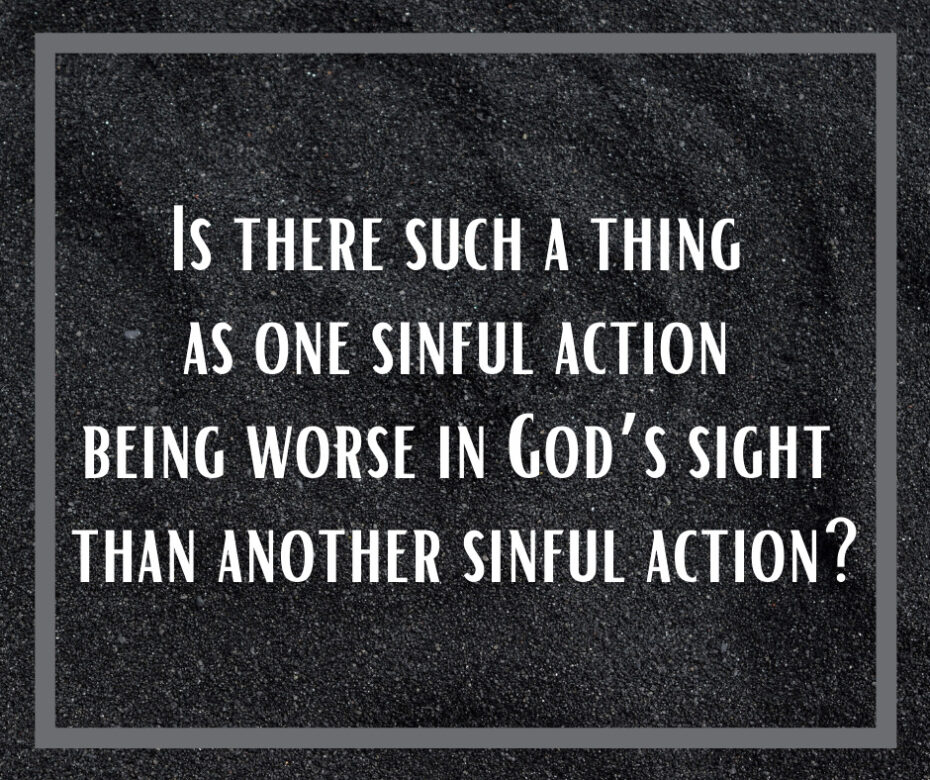Bob G. commented on a recent blog by me:
Interesting.
A similar reasoning might be helpful in the consideration of Jephthah and his daughter. It is plainly wrong to vow to the LORD and not pay—but it is arguably more wrong (is that a thing?) to offer a child as a burnt offering for the LORD, if He has not specifically commanded it.
I think if Jephthah had not paid his vow, he would have faced some chastening—but he should have chosen that, IMO, as the lesser wrong. (I know some say he only kept her perpetually a virgin. It does not read that way to me…)
The question Bob is asking is this: Is there such a thing as one sinful action being worse in God’s sight than another sinful action?
I believe in a hierarchy of ethics, both good and bad.
Few would disagree that some good things are better than other good things. Paul and Barnabas gave John Mark a chance to go with them on their first missionary journey. As far as we can tell, John Mark was not commanded by God to go. They just invited him. He chose to go. That was a better choice than staying home and working his regular job. Choosing not to go would not have been sin. Doing his regular job well would have been a good thing (Col 3:23-24). But going with two apostles on a missionary trip was a better choice.
Being a janitor is a fine occupation. But if you could also be a gifted surgeon and save lots of lives, that would be better.
If you are gifted to be a pastor or missionary and you have a trust fund that means you never need to work, it would be better to go into the ministry than to spend all your time in leisure activities.
Giving $200 to your local church is better than giving $100 (as long as you are able to do so without failing to meet your obligations to family, aging parents, government, and creditors).
My point is that it is important that we choose between the good and the best. How can we maximize our lives for Christ? Our choices matter.
Some evil things are worse than others too. According to Paul in 1 Cor 6:18, sexual sins are sins against the body and result in judgment against the body (e.g., STDs). So sexual sins are worse than most other sins. And while all sexual sins are bad, sins like rape and incest are far worse than premarital sex or prostitution, for example.
Murder and hating someone are both sins. But murder is worse. So, too, committing adultery physically is worse than mental adultery, though both are sin.
I am not speaking about the issue of condemnation before God. Any sin of any magnitude makes one a sinner in need of everlasting life (Gal 3:10; Jas 2:10). But because of the cross, our sins are not a barrier to our being born again by faith in Christ (John 1:29; 3:16).
What I am saying is that the consequences from various sins differ (for both believers and unbelievers). The OT did not prescribe the death penalty for theft, lying, or pride. But it did for murder, adultery, kidnapping, and homosexuality.
Some sins grieve God more than other sins.
God convicts the believer who is walking in fellowship with God with sins in his life. If we confess our sins, God grants us fellowship forgiveness (1 John 1:9). But if we reject His convicting work and decide that we like this sin and wish to wallow in it, then we depart into the spiritual far country. We cease to be in fellowship with God (Luke 15:11-32).
Of course, as King David learned, when he did finally confess sins that he had stubbornly refused to confess, he was forgiven by God, but there still were major consequences for his sins of adultery and murder. God did not impose the death penalty, even though that is what the OT prescribed. But God took the life of the first son of David and Bathsheba. Absalom went in exile, and after he returned, he led a rebellion against David. Ultimately Absalom was killed. Then a plague killed thousands in Israel. All of this because of David’s sins. Forgiveness did not mean that all consequences were removed.
It is always best for the one out of fellowship to return to fellowship with God. By doing so, he does not add additional temporal judgment for himself. But in most cases, God, because He loves us, does not spare the rod. The negative consequences are instructive.


